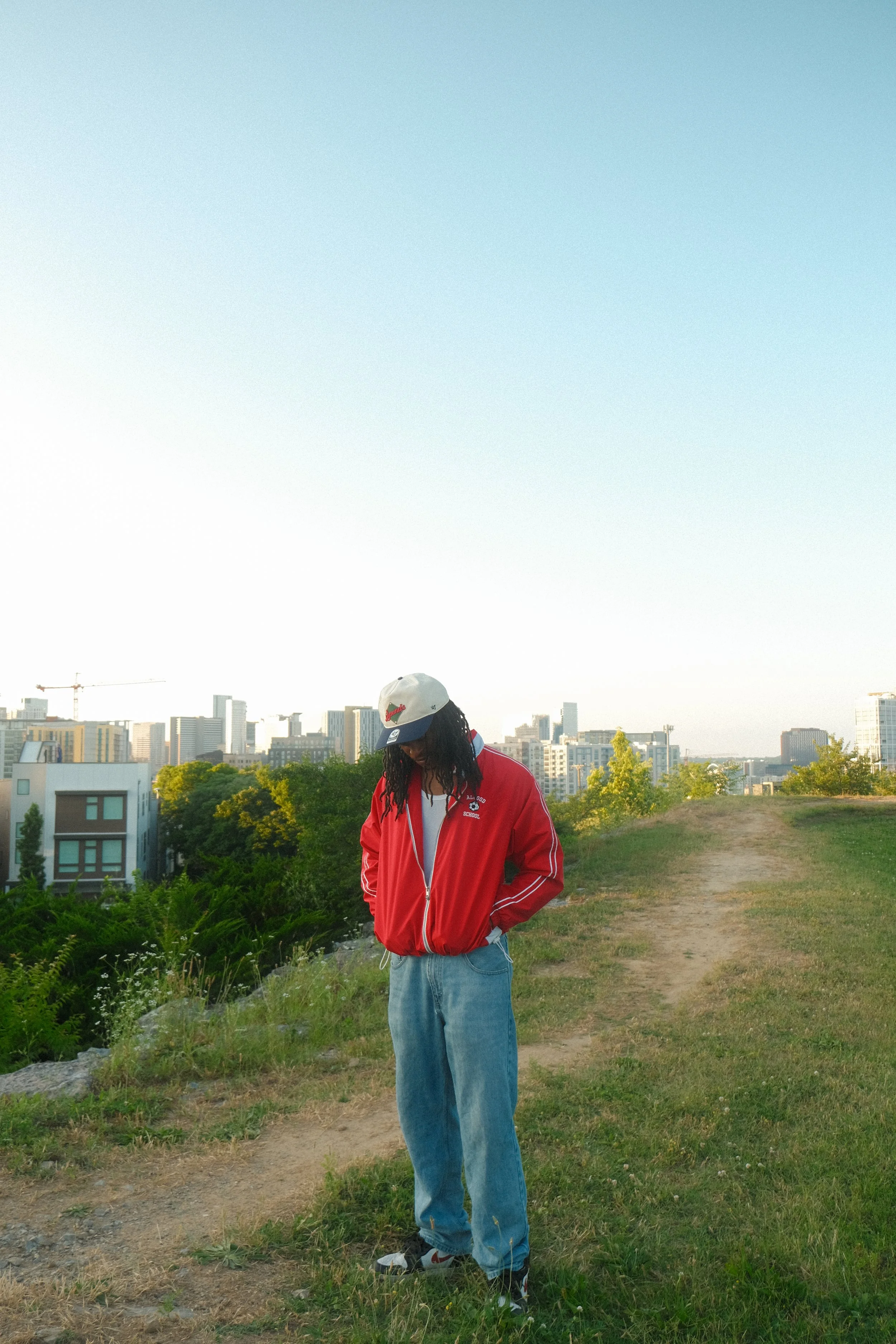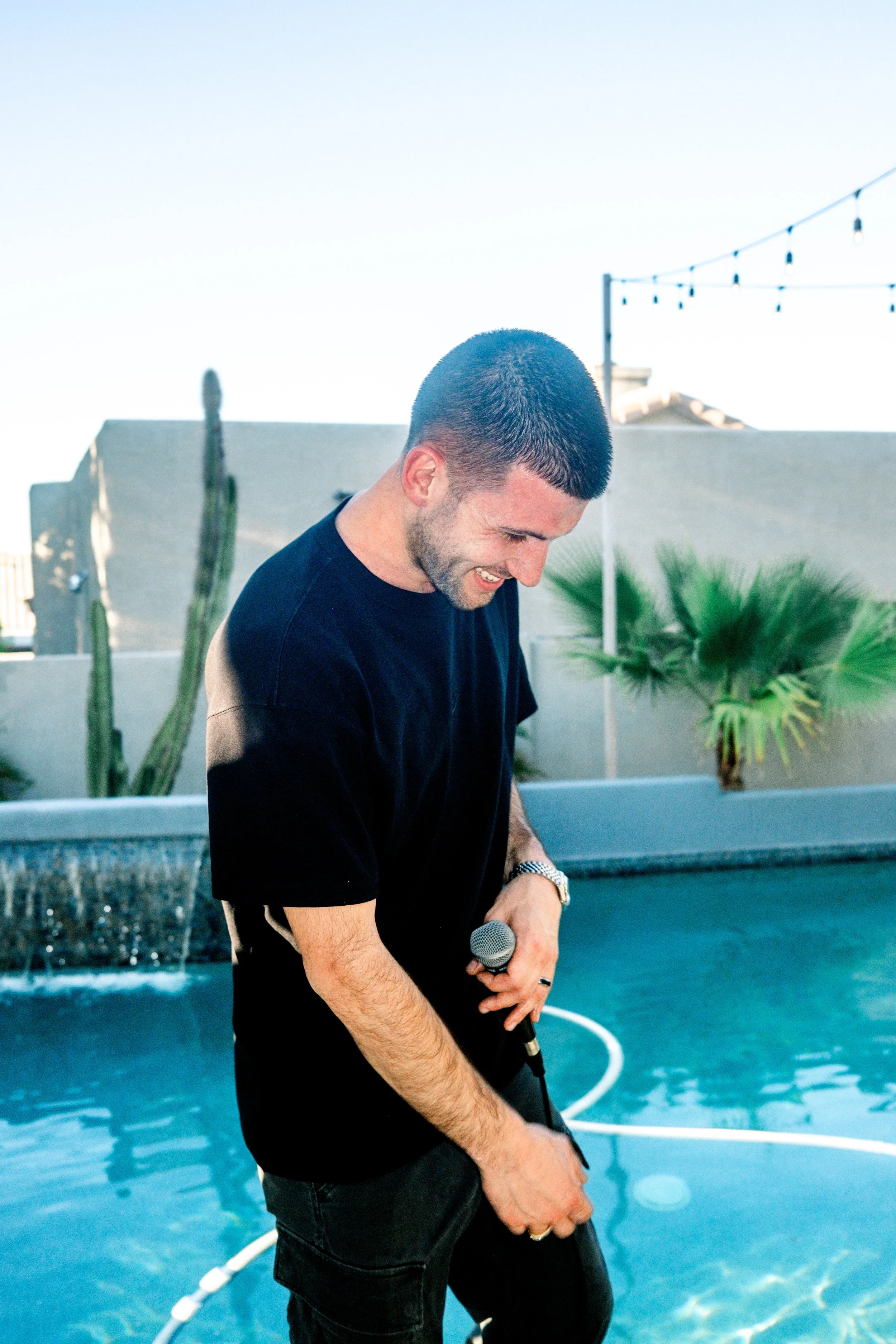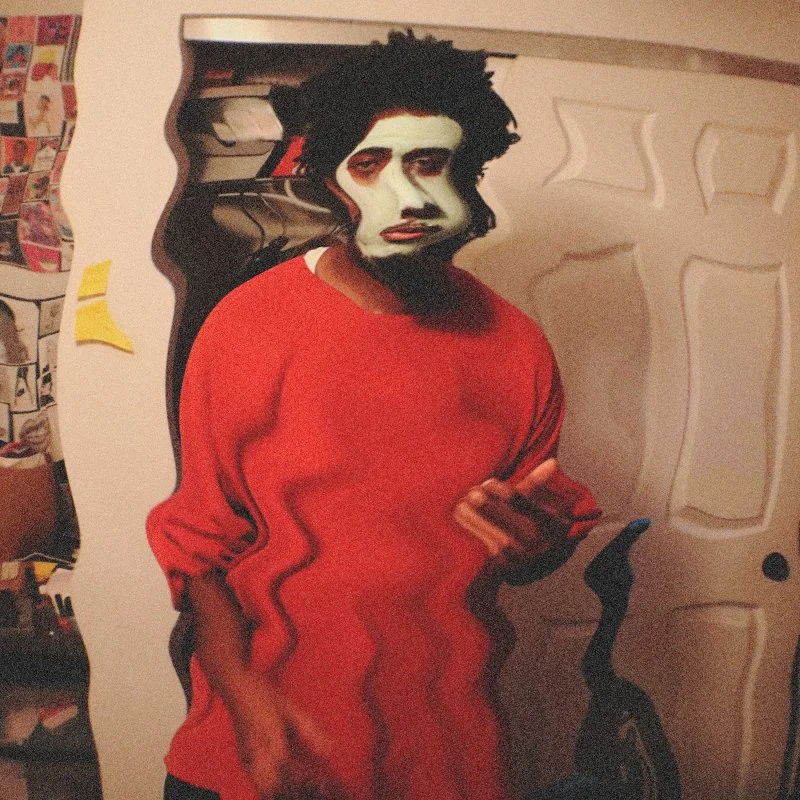Every month, Vault Radio serves as a pulse check — what’s moving, what’s evolving, and what’s rising from the underground. But this isn’t just a playlist. It’s a barometer for mood, for moment, and for momentum. This July edition dives deep into the artists and songs pushing boundaries across alternative hip-hop, experimental R&B, and genreless soundscapes that can’t be boxed in — not by geography, algorithm, or expectation.
These aren’t tracks made to blend in. They’re statements — built on distortion and defiance, intimacy and invention. From sweaty club floors to introspective, late-night unravelings, the music here captures the duality of summer: bright and restless, humid and haunted. It moves between heat and haze, between impulse and intention, reflecting the emotional sprawl of a season where everything feels just a little more vivid.
Whether you’re tuning in for discovery or resonance, this lineup is the sound of what’s next — sharp-edged, soul-stung, and Southern-rooted. Every track holds weight, and every inclusion is intentional. This is the underground, amplified. Welcome to the vault.
JYOU – “HIIT”
Jyou sets the tone for this month’s Vault Radio with “HIIT” — a bold, speaker-knocking track that captures the chaos, humor, and heat of Southern nightlife. Released via East Music Row Records, “HIIT” marks a pivotal moment for the North Nashville native: a new chapter rooted in movement, culture, and creative freedom. It’s not just a single — it’s a signal that something larger is in motion.
Backed by booming 808s and produced by Austin Luther, “HIIT” blends trunk-rattling sonics with Jyou’s signature sharp-witted, hyper-visual lyricism. You can hear the mischief in his voice, the sweat on the floor, the way the night unravels into something blurry but unforgettable. It’s a record that bumps in the car and breathes on the dancefloor — but it also speaks to the nuanced identity of a Southern creative refusing to be boxed in.
Raised by ministers and trained through storytelling, theater, and the grind of Nashville’s underground scene, Jyou moves with intention. His past work — from the hard-hitting “Nest” to his time in the award-winning duo KON — built the foundation. But with “HIIT,” he turns the volume up and the corners sharper. This isn’t a return. It’s a reintroduction.
“I’m Southern, I’m alternative, I’m hip-hop, I’m theater. I’m visual. I’m visceral,” Jyou says. And “HIIT” reflects all of it — a sweaty, Southern, genre-jumping statement of self. It lives somewhere between street anthem and stage show, merging humor with emotional undercurrent. It's the kind of song that makes you dance before you even realize it's teaching you something.
As the first taste of what’s next, “HIIT” doesn’t just open doors — it kicks them in. And Jyou walks through them like he’s been here before. Because he has. Only now, he’s just getting started.
VAN ROBSON – “Make Up”
Van Robson’s “Make Up” doesn’t ask for your attention it earns it quietly, then holds it with intention. The track’s bounce and sheen could fool you into thinking it’s just another love song, but the real story is tucked between the beats: this is a song about recovery, confrontation, and emotional clarity disguised in replayable charm.
Born out of a low point Robson chooses not to detail, “Make Up” was sparked by the presence of someone who pulled him back — his partner, the anchor who inspired the record. Through over-exaggerated lines and heightened energy, Van transforms a personal inflection point into something defiant and digestible, refusing to wallow. Instead, he offers listeners a release rooted in truth.
“This song was released in honesty,” Van explains. “It was personal tension, long-overdue words, and energy I had been giving away without return — all coming out at once.” That vulnerability is central to his art, but it’s never presented raw or unfiltered. Instead, “Make Up” is wrapped in rhythm, polished to catch the ear before it stings the heart. “You’ll be moving through the chorus until you realize what I’m actually saying,” he adds.
This balance between sonic accessibility and emotional weight — is intentional. For Robson and his team, the creative process isn’t just about making something catchy; it’s about shaping something layered. And for those just discovering him through “Make Up,” that depth is the point. He’s not here to control the narrative only to speak truth, and let the frequency do the rest.
“My goal is perspective,” he says. “I just hope people hear the honesty and appreciate the writing.”
Guided by a philosophy that blends curiosity with care, Van draws inspiration from artists like Pharrell, who once said, “We’re just checking out ideas with our library card.” That mindset that music belongs to anyone willing to tap in permeates his work. Every word, every visual, every detail matters.
This past year, Robson also began reshaping his relationship with anxiety. What once felt like a block became a spark. “I’ve always known I was a procrastinator,” he says. “But now I’ve turned that anxious energy into a kind of superpower — writing some of my best music with it. Not that I recommend it.”
“Make Up” isn’t just a bop. It’s a recalibration. A reminder that vulnerability can be stylized, sharp, and still deeply felt. And that sometimes, the catchiest songs are the ones carrying the heaviest truths.
BAILEY STRAUGHN – “Rooftop Party”
If “Rooftop Party” sounds like it was made on a sugar high, it’s because it basically was. Picture this: late-night sessions, fried wings by the hundred, basslines slapping off studio walls, and punchlines so outrageous they made the producers pause the beat to laugh. It’s not just a record—it’s a time capsule from a friend group dead-set on reminding you that rap used to be fun.
Pulled from the trio’s FREE:BASS project, “Rooftop Party” is both homage and reinvention. The beat traces its DNA to Miami Bass and ghetto-tech roots, but Bailey, Jay, and Cadeem flip it with 2025 swagger. The BPM might scream techno, but the vocals are all rap-camp chaos. Bailey’s hook—“me and the boys some sluts for a rooftop party”—isn’t just a bar, it’s a thesis. “He was speaking from the heart,” Jay quips. And the song runs with that sincerity, waffling with joy and head-nods without ever once apologizing for the ridiculousness.
Lyrically, there’s a second layer. Buried in the bright bounce are sharp references, deep cuts, and regional nods for the heads who dig past the first play. Bailey and crew weren’t just rapping—they were researching. Uncle Al, DJ Magic Mike, 2 Live Crew, Brazilian funk samples… “Rooftop Party” is a sonic Easter egg hunt dressed up in a party fit.
Still, this isn’t a dissertation. It’s a reminder that the MC/DJ connection still matters, that a rap record can make you laugh and move, that you don’t have to trade depth for dopamine. “The fun needs to be restored,” Bailey says—and this record is doing that on purpose.
So whether it’s a night out in Arizona, a rooftop set in Brooklyn, or a sticky summer night in your headphones, “Rooftop Party” is for that moment right before things go left. When the pre-roll hits, the beat drops, and the only thing that matters is who showed up—and who brought the wings.
DEDISART – “Static!”
“Static!” isn’t loud. It doesn’t demand attention with theatrics or fireworks. But it moves different—like a memory you thought you outgrew or a lesson that hits harder the older you get. For DedisArt, this track isn’t just a song; it’s a note to a younger version of himself. One written in real time, from a place of reflection, quiet resilience, and emotional clarity. “Be a man when the rain come...” isn’t just the first line—it’s the ignition point.
Over a delicate, emotionally charged beat from Ovrkast., Dedis lets the music speak through him. His writing feels guided by memory, not ego. “Static!” is both an unraveling and a reconstruction—a map through the inner storm of growing up, discovering who you are, and finding the nerve to own it. It’s not nostalgia for nostalgia’s sake; it’s a re-alignment. A full-circle moment where you face the version of yourself that was still figuring it all out and finally give them the grace they deserved.
Lines like “How he a leader but closed off, ducking the call like a stray shot” hit like a quiet reckoning. It's the kind of bar that may slip past you the first time, but on repeat listens, it becomes a mantra. The song doesn’t build to some dramatic crescendo—it stays suspended in that emotional in-between, just like the phase of life it represents. Fear, courage, silence, and breakthrough all braided together.
“Static!” lives in that liminal space—between breakthrough and breakdown, between the storm and the sunrise. It’s a reminder that rain never lasts forever, that identity is not a finish line but a process. For DedisArt, this track is both therapy and affirmation. And for the listener, it might be a quiet push to answer that same call.
OMOTIZAY – “DROP THA TOP”
With “Drop Tha Top,” Omotizay pulls off something rare: capturing the euphoria of summer without losing the nuance of self-awareness. It’s breezy, bright, and built for motion—but under the surface, it’s also a meditation on memory, fantasy, and freedom. The track opens with the spirit of a classic—think DJ Jazzy Jeff & The Fresh Prince’s “Summertime”—but reinterpreted through Omotizay’s lens: queer, liberated, lyrically agile, and unapologetically self-produced.
Inspired by a simple moment—riding with the windows down while his mom queued up nostalgic jams—“Drop Tha Top” is both tribute and transformation. It’s not just about cruising; it’s about carving space. About joy as resistance. About the kind of fantasy that makes you feel free right now, even if it’s just for the length of a hook. “This a fantasy...” might be the line most people miss on first listen, but for Omotizay, it’s the heartbeat. A quiet acknowledgment that this entire world he’s painting is a choice. A necessary one.
As the intro to his album Power Over Life, this track sets the tone—funky, fierce, and emotionally sharp. It’s a signal that the escapism here isn’t hollow—it’s earned. Omotizay isn’t just flexing new sonic muscles (though the beat is crazy); he’s showing a level of artistic clarity that comes from unlearning doubt, rejecting self-hate, and learning to create from comfort rather than critique.
In a scene often preoccupied with hardness or heartache, “Drop Tha Top” makes space for soft power—vulnerability masked as vibe, storytelling wrapped in summer sheen. Omotizay calls it a Costco sample of what’s to come, but this appetizer slaps harder than most full meals. Play it loud, drive with the windows down, and don’t forget to catch the real underneath the glitter.
DMNDSTR – “ALLDUETOGOD” & “DRIFT AWAY”
Sometimes clarity doesn’t come in the moment — it reveals itself in the playback. For Dmndstr, two songs from vastly different seasons of life collide in this month’s spotlight: “Drift Away,” a raw dispatch from the haze of teenage angst, and “Allduetogod,” a more recent offering of hard-won gratitude and spiritual reckoning. Together, they trace the arc of an artist learning to hold space for both darkness and deliverance.
“Drift Away” was recorded at 18, with strep throat and a head full of static. It sounds like it too — distorted, dissonant, and emotionally frayed at the edges. It’s not polished, but it’s piercing. The kind of record you make when you’re less concerned with being understood and more focused on surviving your own thoughts. It’s a timestamp, yes, but also a portrait: of isolation, illness, and a teenage mind unraveling then rethreading through melody.
Fast forward, and “Allduetogod” finds Dmndstre on a different frequency. Created after college, it carries a brighter sonic palette and a shift in posture — not triumphant, but honest. The lyrics still slide into unexpected wordplay (“rock, paper, scissors” lands with endearing charm), but underneath the wit is something more grounded: faith, reflection, a little bit of flex. It’s joy that doesn’t feel performative. It’s earned.
Both records preview the emotional terrain of his upcoming mixtape All My Niggas Work Harder Than Me — a project rooted in grief, diagnosis, and the quiet process of rebuilding self-trust after mental health collapse. Where “Drift Away” feels like exhale through pain, “Allduetogod” is the first real breath after the storm. As Dmndstre puts it, one track was for venting, the other for gratitude — and the full project is for clarity.
In an era of over-curated personas, Dmndstre’s work feels unfiltered without losing intention. He’s not hiding the mess. He’s learning to frame it. And in doing so, these two songs don’t just show growth — they remind us that healing rarely moves in a straight line.
Low.bō – “blur”
There’s a quiet ache woven into the fabric of Low.bō’s “blur” — not the kind that erupts, but the kind that lingers in silence, in side glances, in the texts you never send. Produced by Scotty White and Elijah Bieuzieron, it’s a rare track on the project that Low.bō didn’t produce himself — and the shift in sonic chemistry is palpable. The textures are soft-edged and swelling, echoing a disoriented longing that flickers just beneath the surface.
“‘blur’ lives in that messy middle,” Low.bō says. And you hear it — the tenderness, the restraint, the unsent confessions embedded in lines like: “Wish I could come see you more / Can’t help the feelings that change now / Like summer going into fall.” It’s Alt-R&B at its most vulnerable — not toxic, not tragic, just… unfinished.
Where lead single “FALLOUT” tore through heartbreak with soaring tension and searing guitar, “blur” slows the frame. It’s a meditation on timing and distance, both emotional and physical, that feels as cinematic as it is personal. Low.bō’s gift lies in that duality — his ability to soundtrack the subtleties most people skip past.
Raised in Baltimore’s church choirs and forged in solitude during a period of deep isolation, Low.bō built his world from the ground up — first through photography, then through production, songwriting, and performance. Now, fresh off praise from Billboard and OVO Sound Radio and a spotlight on Spotify’s Vanguard playlist, he’s doubling down on the honesty that made his prior projects CIRCA and IMPALA resonate.
“blur” doesn’t demand attention. It drifts into your chest slowly — until you realize it’s been sitting there the whole time
Zugz – “Intro to You”
With a distorted grin and a sharp tongue, Zugz kicks off his latest era by giving voice to someone — or something — else entirely. “Intro to You,” the opening salvo from his upcoming project, isn’t just an introduction to a sound. It’s the entrance of a character: Pilotboy, a bold, defiant persona built to explore everything Zugz couldn’t say outright — until now.
“I was kinda angry,” Zugz admits, reflecting on where his head was at after dropping his first EP, 04’. “It got some streams but didn’t really feel legit… I didn’t feel like I proved to myself how good I could be.” That fire — the need to make something undeniable — became the engine behind this record. And Pilotboy was the vessel.
Inspired by concept albums and the exaggerated honesty of alter egos, Zugz created Pilotboy as an emotional amplifier — a persona that could “run rampant with feeling” without filter or restraint. The result is a track that feels theatrical but grounded, aggressive but intentional. It's all delivered with a sneer that’s both cartoonish and deadly serious.
At surface level, “Intro to You” smacks with raw energy. But Zugz challenges listeners to hit replay — to catch the setup, the hidden commentary, the myth-making buried in the margins. It’s a scene-setter for a tightly constructed album arc, a self-contained journey where every beat has a purpose, and Pilotboy only sticks around long enough to serve his emotional function.
“I want the listener to feel free,” Zugz says. And in that freedom is the point — permission to be larger than life, to be loud, layered, and unapologetically yourself.
Pilotboy might be a one-time thing, but the confidence behind him? That’s here to stay.
This month’s Vault isn’t just a snapshot it’s a statement. Every track speaks to the edges of what’s possible when sound, story, and self collide. Whether it shook your speakers or sat with your spirit, we want to know what lingered.









